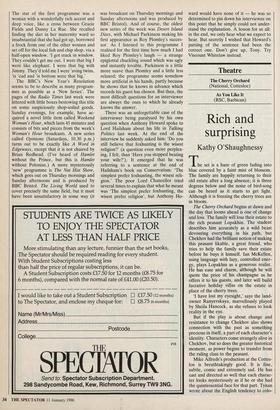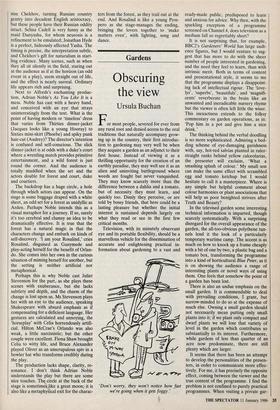Theatre
The Cherry Orchard (National, Cottesloe) As You Like It (RSC, Barbican)
Rich and surprising
Kathy O'Shaughnessy
The set is a haze of green fading into blue covered by a faint mist of blossom. The family are happily returning to their old estate after a long absence; it is three degrees below and the noise of bird-song can be heard as it starts to get light. Although it is freezing the cherry trees are in bloom.
The Cherry Orchard begins at dawn and the day that looms ahead is one of change and loss. The family will lose their estate to the rich peasant Lopakhin. The student describes him accurately as a wild beast devouring everything in his path, but Chekhov had the brilliant notion of making this peasant likable, a great friend, who tries to help the family save their estate before he buys it himself. Ian McKellen, using language with lazy, controlled ener- gy, plays Lopakhin as a generous realist. He has ease and charm, although he will quote the price of his champagne as he offers it to his guests, and later will build lucrative holiday villas on the estate in place of the cherry trees.
`I have lost my eyesight,' says the land- owner Ranyevskaya, marvellously played by Sheila Hancock, as she refuses to look reality in the eye.
But if the play is about change and resistance to change Chekhov also shows connection with the past as something precious in itself, a part of each character's identity. Characters come strangely alive in Chekhov, but so does the greater historical moment, as power begins to transfer from the ruling class to the peasant.
Mike Alfreds's production at the Cottes- loe is breathtakingly good. It is fine, subtle, comic and extremely sad. He has cast and directed so well that each charac- ter looks mysteriously as if he or she had the quintessential face for that part. Tynan wrote about the English tendency to colo-
nise Chekhov, turning Russian country gentry into decadent English aristocracy, but these people have their Russian oddity intact. Selina Cadell is very funny as the maid Dunyasha, for whom neurosis is a refinement to be emulated; Jonathan Hyde is a perfect, hideously affected Yasha. The timing is precise, the interpretation subtle, and Chekhov's gift for naturalism in start- ling evidence. Many scenes, such as when they all sit silently in the field, staring out at the audience as if at the horizon (an odd event in a play), seem straight out of life, and the effect is nearly surreal. Ordinary life appears rich and surprising.
Next to Alfreds's enchanting produc- tion, Adrian Noble's As You Like It is a mess. Noble has cast with a heavy hand, and conceived with an eye that strays uninterestingly from the text. What is the point of having modern or 'timeless' dress that varies from Thirties dinner-jacket (Jacques looks like a young Hooray) to Sixties mini-skirt (Phoebe) and spiky punk hair-cut (Audrey)? The director's intention is confused and self-conscious. The slick dinner-jacket is at odds with a duke's court where a wrestling match provides primitive entertainment, and a wild forest is just round the corner. And the audience is totally muddled when the set and the actors double for forest and court, duke and courtiers.
The backdrop has a huge circle, a hole through which actors can appear. On the stage is some baggage draped with a white sheet, an odd set for a forest as unidyllic as Arden. Perhaps Noble intends this as a visual metaphor for a journey. If so, surely it's too cerebral and clumsy an idea to be dramatically effective. It is true that the forest has a natural magic in that the characters change and embark on kinds of self-discovery. 'I am your Rosalind,' cries Rosalind, disguised as Ganymede and play-acting herself for the benefit of Orlan- do. She comes into her own in the curious situation of miming herself for another, but the setting is neither artificial nor metaphorical.
Perhaps this is why Noble cast Juliet Stevenson for the part, as she plays these scenes with exuberance, but she lacks subtlety and depth, and the charm of the change is lost upon us. Ms Stevenson plays her with an eye to the audience, speaking Shakespeare with absurd emphasis as if compensating for a deficient language. Her gestures are calculated and annoying, the 'horseplay' with Celia horrendously artifi- cial. Hilton McCrae's Orlando was also weak, a little narcissistic; but the other couple were excellent. Fiona Shaw brought Celia to witty life, and Bruce Alexander played Oliver as an unscrupulous spiv in a bowler hat who transforms credibly during the play.
The production lacks shape, clarity, re- sonance. I don't think Adrian Noble understands the play but there are some nice touches. The circle at the back of the stage is sometimes like a great moon; it is also like a metaphysical exit for the charac- ters from the forest, as they trail out at the end. And Rosalind is like a young Pros- pero as she stage-manages the ending, bringing the lovers together to 'make matters even', with lighting, song and dance.



























































 Previous page
Previous page